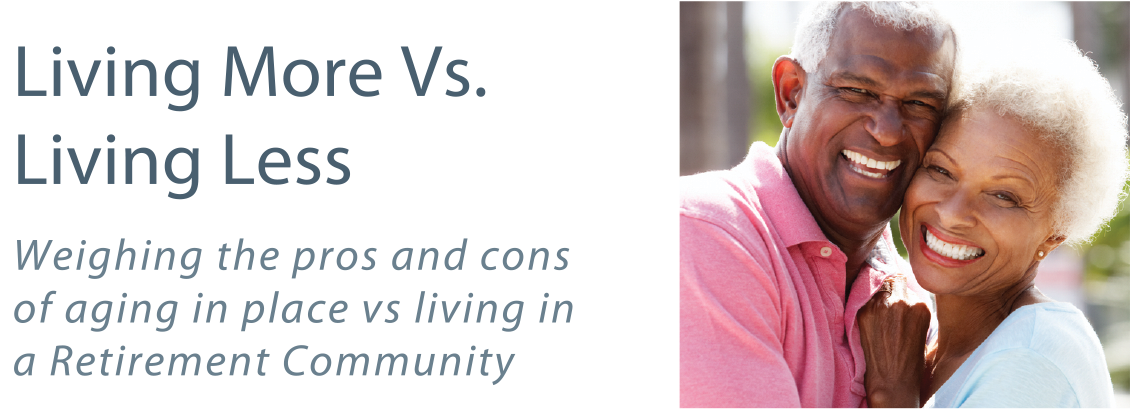Insights | Blogs

For today’s modern senior, retirement has changed. Seniors are living longer, but the age of retirement remains the same, meaning that most seniors now have two chapters to their retirement. The first chapter is leaving behind their work responsibility, then the second chapter which necessitates shifting their focus to safety and health.
Much of the work of retirement is in making complex decisions. When to retire. How to manage expenses on a fixed income. What to do about healthcare. How to make the most of the retirement years. And along with these many decisions comes yet another: where to retire. This is not an easy decision, because you have a lot of options, each with distinct advantages and disadvantages.
Staying in your current home allows you to continue in the activities you’ve come to enjoy, like gardening or tinkering in your garage. You are able to accommodate houseguests and hold onto treasures you’ve collected over the years. You have your freedom and independence and enjoy a pride of ownership. On the other hand, you may find the chores and upkeep associated with owning a home become a burden – both financially and physically. As your needs increase or health diminishes, you may find that in-home care is too expensive or that you need to make changes to your home due to your physical limitations. On your own, you may feel socially isolated or that your safety is at greater risk as you age. Research shows that inactivity and isolation increase the chance of dementia for seniors by 64%.
Moving to a retirement condo is sometimes considered to be a middle ground between staying in a house and living in a retirement community. It normally means no yardwork or exterior home maintenance chores. You still own a home and have your independence and freedom, and in some instances, greater security. You likely can find a condominium that helps you avoid using stairs, and you may even have access to concierge services, depending on the community. On the downside, association assessments can be expensive, as can be any in-home care you might need over the years. And as with living in a house, you may still find yourself in need of another transition if your health declines more in your later years.
Living in a retirement community built to suit the changing needs of seniors provides security and peace of mind in an environment that offers an all-in-one community with caring, regulated oversight managed by experts. You have comfortable living arrangements and a wealth of amenities and services. Today’s retirement homes have been compared to living on a cruise ship that doesn’t float. You’ll have ample opportunities to socialize in a community of like-minded people. Many retirement communities offer transportation services and wellness programs. And, some are life plan communities that provide different levels of care such as independent living, assisted living, memory care, skilled nursing and rehabilitation, to enable you to transition to the level of care you need, when you need it. Best of all, with the right retirement community, you have the security of knowing you are in control with trained advocates by your side. While the cost associated with senior communities may appear to be higher at first glance, after considering all the services included, further calculations may help put those concerns to rest.
As you consider which option is right for you, also consider the three Hs of retirement living: Housing, Hospitality, and Healthcare. Consider which option has the right balance of each, giving you what’s most important in a home environment, in services and socialization, and in meeting your health needs. Do your homework and make a list of your “must haves”. Make time to visit all of your options in person – and ask lots of questions. If you are leaning toward a retirement community, get on a waiting list. Many of the best places may be full so getting on a list before you need it is always a smart move.
The right place for you will make you feel right at home at every age and stage of your retirement.

About Brazos Towers:
Brazos Towers at Bayou Manor has been Houston’s most trusted non-profit retirement community since 1963. Here, seniors receive all the support services they might ever need: Independent Living, Assisted Living, Memory Care, Skilled Nursing and Rehabilitation. This environment focuses on experiencing the most freedom, interesting engagement and personal independence possible, regardless of one’s capabilities.
About the Author, Michelle Watkins:
As Retirement Counselor, Michelle helps seniors successfully navigate their choices by better understanding the differences between communities and the services they offer.
Contact her at 713-660-5033 to schedule your complimentary retirement planning consultation or email michelle.watkins@houstonretirement.org.







